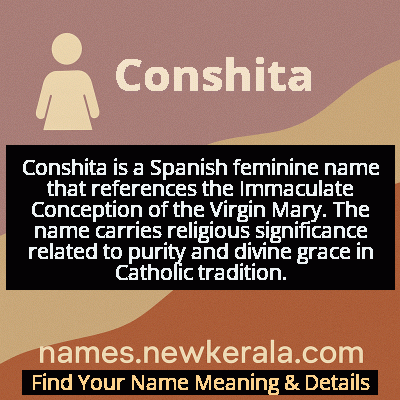Conshita Name Meaning & Details
Origin, Popularity, Numerology Analysis & Name Meaning of Conshita
Discover the origin, meaning, and cultural significance of the name CONSHITA. Delve into its historical roots and explore the lasting impact it has had on communities and traditions.
Name
Conshita
Gender
Female
Origin
Spanish
Lucky Number
8
Meaning of the Name - Conshita
Conshita is a Spanish feminine name that references the Immaculate Conception of the Virgin Mary. The name carries religious significance related to purity and divine grace in Catholic tradition.
Conshita - Complete Numerology Analysis
Your Numerology Number
Based on Pythagorean Numerology System
Ruling Planet
Saturn
Positive Nature
Ambitious, efficient, realistic, and authoritative.
Negative Traits
Materialistic, stressed, confrontational, and can be overly ambitious.
Lucky Colours
Dark blue, black.
Lucky Days
Saturday.
Lucky Stones
Blue sapphire, amethyst.
Harmony Numbers
2, 4, 6.
Best Suited Professions
Business leaders, managers, financial services, law enforcement.
What People Like About You
Leadership, determination, organizational skills.
Famous People Named Conshita
Conshita Martínez
Religious Educator
Founded several Catholic schools for underprivileged children in rural Spain
Conshita García
Community Leader
Organized cultural preservation initiatives in Spanish-American communities
Conshita Rodríguez
Artist
Created religious art exhibitions celebrating Marian traditions across Spain
Name Variations & International Equivalents
Click on blue names to explore their detailed meanings. Gray names with will be available soon.
Cultural & Historical Significance
In Spanish-speaking cultures, names referencing the Immaculate Conception carry significant religious weight and are often given to girls born around December 8th, the Feast of the Immaculate Conception. The name Conshita reflects the intimate, familial devotion to Mary that characterizes much of Hispanic Catholicism, where the Virgin is not only a theological figure but also a maternal protector and intercessor. Throughout Spanish history, the Immaculate Conception has been associated with national identity and cultural pride, making names like Conshita bearers of both religious faith and cultural heritage.
Extended Personality Analysis
Women named Conshita are often perceived as possessing a gentle strength and spiritual depth that reflects their name's religious origins. They tend to be compassionate, nurturing individuals with a strong sense of morality and family values. Their connection to the Immaculate Conception symbolism often translates into personalities marked by purity of intention, sincerity in relationships, and a natural inclination toward caregiving and community service.
These individuals typically exhibit remarkable resilience and inner peace, even when facing challenges. They often serve as moral compasses within their social circles, offering wisdom and comfort to others. While deeply principled, they usually express their convictions with grace and understanding rather than judgment. Their spiritual nature doesn't necessarily mean they're overly serious—many Conshitas balance their profound inner life with warm humor and joyful engagement with family and community celebrations, particularly those with religious significance.
Modern Usage & Popularity
In contemporary times, Conshita remains a name primarily used within Spanish-speaking Catholic communities, though its usage has declined somewhat in favor of more modern names. It continues to be popular in traditional families and rural areas where religious naming conventions persist strongly. The name maintains particular relevance in countries like Spain, Mexico, and parts of South America where devotion to the Immaculate Conception remains vibrant. While not among the most common names today, it enjoys periodic revivals when parents seek names with deep cultural and religious significance. Modern bearers often appreciate the name's connection to heritage and faith, even as they navigate contemporary society.
Symbolic & Spiritual Meanings
Symbolically, Conshita represents purity, divine grace, and spiritual protection. The name evokes the concept of being chosen or set apart for a sacred purpose, mirroring the Marian theology of the Immaculate Conception. It carries connotations of innocence preserved, moral integrity, and the idea that true strength comes from spiritual grounding rather than worldly power. The name also symbolizes the blending of humility and majesty—qualities associated with Mary in Catholic tradition. In a broader sense, Conshita represents the cultural memory and living tradition of Hispanic Catholicism, serving as a linguistic vessel carrying centuries of devotion, family values, and community identity.

